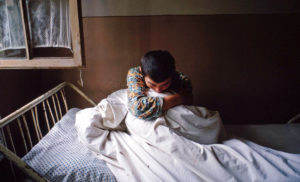Andrea Albutt has been a dedicated public servant for almost four decades who worked as a military nurse and ran four prisons. But after eight years as president of the Prison Governors Association, she despairs of the crumbling institutions, overwhelmed staff and record-breaking rises in violence, suicide, and self-harm inside cells. So when invited to speak to MPs at Westminster, she took advantage of her looming retirement to savage the collapse of the prison system under their custody.
Albutt blasted their populist gimmicks, short-term stunts, botched spending cuts and the revolving door of 11 justice secretaries since the Tories took office in 2010, who “achieved nothing but decline” in the functioning of her sector. Her conclusion to the all-party group on penal affairs was stark: that politicians are failing inmates, staff and the wider public as they cram more and more people into “warehouses of despair, danger and degradation”.
It was a startlingly honest appraisal of how inadequate politicians played tribal games at the expense of a public service. As she ran through the failures of individual ministers, the Tories were, inevitably, at the receiving end. Yet she was scathing, too, about the Imprisonment for Public Protection regime, a callous legacy of New Labour that has left people with comparatively short sentences still behind bars 20 years later, despite the ditching of the policy more than a decade ago.
The core issue behind Albutt’s outburst is the soaring prison population, which has doubled since she was born 56 years ago. Our incarceration rates became the highest in Western Europe before the turn of the century, then kept on rising. Now we have 87,063 prisoners in England and Wales — and are predicted to hit 100,000 by the end of this decade. Each inmate costs an average of £47,000 a year, slightly more than the fees for Eton. Yet Albutt accused politicians of deceiving the public by promoting a myth that locking up more and more people for steadily longer terms makes society safer. “It’s a lie,” she said bluntly. “Prison does not work.”
Few voters really care about prisons, of course, nor will they shed any tears for convicts crammed into squalid cells. But we should heed Albutt’s warning as crime rises up the political agenda, both parties viewing it as an issue that could sway key voters in swing seats. The Government just delivered a raft of law and order pledges in its ‘crime week’, the latest in a series of dismal themed policy drives in a bid to win back support. Labour responded that ministers have lost control — a point underlined by the home secretary’s suggestion that police might like to tackle offences such as bike thefts and burglaries.
Yet while these politicians tussle to look tough, prisons expose how our democracy is floundering. Sir Winston Churchill, who spent time in captivity during the Boer War, said treatment of criminals “is one of the most unfailing tests of the civilisation of any country”. He argued forcefully against excessive use of sentencing, warning that it was hard to rehabilitate jailed convicts. He told the Commons during his brief time as home secretary “the first real principle which should guide anyone trying to establish a good system of prisons should be to prevent as many people as possible getting there at all”.
Westminster has failed to heed this advice. New Labour passed 28 criminal justice bills and put one new offence on the statute book for every day they were in office over 13 years. Then the Tories ramped up sentencing so that the average length of a prison sentence increased by 55% over the past decade. Austerity forced the police to spend more time picking up pieces of other crumbling public services such as mental health and social care, while the percentage of crimes leading to a charge crashed. Only days after Albutt spoke to parliament, the Met Police chief Mark Rowley said his officers would no longer attend mental health emergencies.
But these problems run deep in our society. We know, for instance, that many prisoners come from broken families or chaotic backgrounds. We know they often struggle with issues such as addiction, autism, illiteracy, mental illness or learning disabilities. The House of Commons Justice Committee found seven in 10 prisoners may have mental health needs and that these can worsen behind bars: these MPs admitted prison can be “inappropriate” and “inhumane” for those with most severe psychological problems.
Nor does this swamped, unloved system curb reoffending. Short sentences are especially damaging with 55% of those locked up for less than 12 months reoffending. During his stint as prisons minister, Rory Stewart dared to admit: “The best way of protecting the public is to significantly reduce, if not eliminate, the under 12-month prison population, because people on community sentences are less likely to re-offend than people put in prison.” Yet only Scotland has introduced a presumption against use of such sentences.
If rehabilitation doesn’t work, how about deterrence? This was exposed as another myth by the Sentencing Council of England and Wales, which published a landmark review last year. The authors pointed out that few offenders knew much about sentencing policies while criminal acts tend to be spontaneous, often driven by anger, drink, drugs, or mental health episodes. “We note that some have argued it is time to accept that sentence severity has no effect on the level of crime in society,” the study concludes drily.
These findings reinforce those of the Transform Justice think tank, which looked at assaults on health workers and police officers. Despite the penalty for these nasty crimes quadrupling over four years,, the number of recorded offences actually rose. “Most victims want the person who harmed them not to harm them or other people again,” said director Penelope Gibbs. “They don’t necessarily want their day in court or retribution. Unfortunately, more prison is unlikely to meet the needs of victims or reduce crime. A government that really cared about cutting crime, rather than simply winning headlines would reduce imprisonment.”
In the United States, even many conservatives have come to see that it makes no sense to keep locking up damaged citizens, whether on fiscal, redemptive, or simply criminal justice terms. The “Right-on-Crime” movement, placing an emphasis on rehabilitation over punishment, started out in Texas before sweeping the Republican Party after both main parties agreed that locking up more and more people was a costly failure. This goes to show that even in such a divided country politicians can reach across the tribal chasm and shift the terms of public debate, leading to a dramatic 25% decline in prison populations since 2009.
As US advocates of reform have pointed out to me, it is far tougher to force people to change errant behaviour than simply to slam them into crowded cells. But Labour — driven again by Blairites — senses Tory vulnerability on crime and has stolen a lead on this issue in polls. The Tories by contrast think voters can be persuaded Labour is “soft” on crime under a former director of public prosecutions while latching onto an issue that unites both traditional Tories and new Red Wall recruits .
What makes this even more depressing is that an alternative approach has been proven to work in a nearby nation. Norway had even worse recidivism rates than Britain three decades ago, with seven in 10 prisoners reoffending within two years of release. It had a justice system like our own: built on the concept of deterrence with offenders given long sentences in grim institutions. But instead of blundering on with failure, their leaders boldly switched course. They were rewarded with the world’s lowest recidivism rate, which sees only one in five prisoners reoffending.
The key was to focus less on revenge and more on rehabilitation. Offenders lose their liberty but are given the chance to change their lives. Prisons tend to be small to break up violent cultures and dotted around the country to keep inmates close to their families. Cells are basic but have televisions, computers, fridges, and showers. They offer facilities such as yoga, saunas, music studios, tanning beds, fitness rooms, car workshops and cooking classes. Guards and prisoners enjoy barbecues and play sport together — and in some units, up to half the officers are women. Above all, there is an emphasis on study and work to develop skills in preparation for freedom — not abandonment in overcrowded cells.
Halden Prison, set in a forest 60 miles south of Oslo, has been labelled the most humane prison in the world although it is a maximum-security institution holding 250 men convicted of the worst crimes. It cost £138 million to build, winning a design award for its minimalist style and efforts to minimise stress. Inmates have appeared on reality television shows and released music under the label Criminal Records. There are no guns or barbed wire on display — although prisoners are still locked up in their rooms at night.
The legacy of such intense focus on rehabilitation is that Norway now has fewer than half the number of prisoners per capita as Britain. But Norway’s strategy is not just about treating prisoners well: it is about keeping people out of prison as far as possible. During its period of reform, prison sentences were reduced. Life sentences were abandoned with a 21 year maximum — although this can be extended in five-year increments if there is perceived danger.
Although the average cost per head of such prisons is significantly higher than our own, it is estimated that rehabilitated offenders save the state about £110,000 per person in terms of law enforcement costs and lower benefits. Crime comparisons are hard given differences in data collection, but the European Crime Index puts Norway comfortably in the top half of safest nations while the UK comes close to the bottom, just above Italy, Sweden and Belarus. Yet our leaders refuse to shift path, spending an immense £3.8bn to push another 20,000 people into more of these “warehouses of despair, danger and degredation”.
This failure by Westminster has a catastrophic impact on the rest of society. Politicians need to display some courage and admit that our prison system does not work, does not deter crime and does not provide value for money. “It’s really very simple,” said one prison warden in Norway. “Treat people like dirt and they’ll be dirt. Treat them like human beings and they’ll act like human beings.”
Disclaimer
Some of the posts we share are controversial and we do not necessarily agree with them in the whole extend. Sometimes we agree with the content or part of it but we do not agree with the narration or language. Nevertheless we find them somehow interesting, valuable and/or informative or we share them, because we strongly believe in freedom of speech, free press and journalism. We strongly encourage you to have a critical approach to all the content, do your own research and analysis to build your own opinion.
We would be glad to have your feedback.
Source: UnHerd Read the original article here: https://unherd.com/




